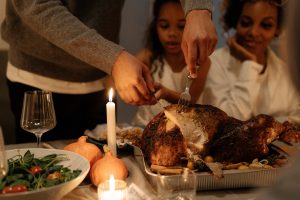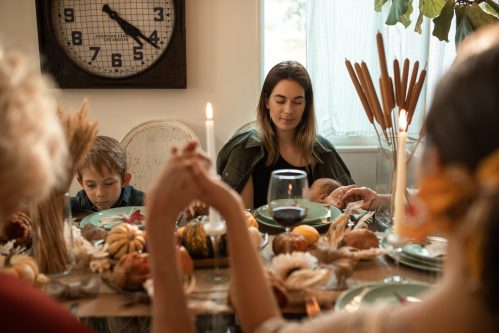Heading into the holidays can be a stressful time for anyone, and if you have an eating disorder, it can really throw you. Thanksgiving is a holiday of food and family—two things that can be triggering if you struggle with disordered eating. Being stuck in a house with a group of people can compound the pressure, and when it’s cold outside, that can make it more challenging to step away from a stressful situation.
So if you have an eating disorder—or even if you don’t—it’s smart to mentally prepare yourself for Thanksgiving. Before the day arrives, check out these three emotional tools you can bring with you to the Thanksgiving dinner table to help navigate challenging moments. The most important thing to remember: Be kind to yourself.
1. Set an intention for the day
Choose an easy, achievable goal for the day. Check in with yourself throughout the day about how that’s going. This should be broad, appealing, and achievable.
Ideas for possible intentions:
* Connect with family and friends.
Remember that people are messy and imperfect, so connecting with them will probably feel that way too. Maybe your uncle will have a bit too much to drink and get intense and political. Maybe your mom will say something that makes you uncomfortable.
Amongst all of these “bad” moments, there will likely be some good moments, too. Seeing younger family members grow, saying hello to someone visiting from far away. Remember that your presence brings other people joy, too.
Being together with others can be a mixed bag of emotions. Give yourself credit for being brave and showing up.
* Be aware of what your senses are telling you.
Sometimes what is stressful about a get together with others is the stories we tell ourselves in our head. Are people judging me? Focus your intention on noticing—and enjoying—all five of your senses: touch, smell, hearing, sight, and taste. Paying attention to the sensations of your body is a good way to stay grounded in the moment, which can keep you from getting caught up in ruminating or critical thoughts.
If you’re feeling anxious, you can silently ask yourself any one of these questions: What am I feeling with my fingers or in my body? What do I smell and hear? Is there something soothing to look at? Sometimes, the sensory experience might be an anxiety response in the body: tense shoulders, for example. That’s okay. It’s part of your experience. Be kind to yourself and try to feel compassion. You can say to yourself: “This is hard. I am feeling some stress in my shoulders.”
Make sure you acknowledge and allow the difficult experiences. But also, be open and curious about what sparks a feeling of joy for you. Maybe you survey the room and feel a wave of happiness seeing all the colors and textures of the clothing people chose to wear today.
Making note of your sensory experience can leave you with some rich, beautiful memories. The day becomes a collection of textures, colors, tastes, scents, and sounds. And you are free to revel in the beautiful ones and release the less pleasant ones.
2. Choose your coping strategies
It can be super helpful going into any situation where you might have some anxiety to choose your coping tools ahead of time. It’s just another way of feeling prepared that will help you stay cool and calm.
* Notice and be intentional with your breath.
Remind yourself to breathe deeply and calmly as you speak with people. It’s common to start breathing more quickly and more “shallow” when someone is making you feel anxious or they are talking fast. Tip: Periodically ask yourself: “How’s my breathing?” And work on adjusting if it could be better.
* Grant yourself the freedom to step away from any conversation when you are ready.
It’s great if you can go into a social situation with the intention of being open to any conversation that comes up. But if the person is overwhelming to you, or the topic is bringing you down or causing you anxiety, set that boundary. Give yourself permission to excuse yourself to use the restroom or get a drink.
If you are a people pleaser this can be hard, but it is especially important for you to break familiar patterns of getting “stuck” in a conversation as your anxiety increases. Remember, being kind to yourself is your number one goal today.
* Check-in with an ally.
Will there be someone at the Thanksgiving gathering that you feel particularly close to—someone who makes you feel calm and grounded? If so, consider connecting with them ahead of time and let them know that you can use their support during Thanksgiving. Try not to over-engineer it. Maybe just tell them that you’re feeling a little anxious about Thanksgiving, but you’re looking forward to seeing them.
A “pregame” conversation with someone you trust might relax some of your tension. If you don’t want to chat ahead of time, you can also just take comfort in knowing that person will be there, and then make sure to connect with them while you’re there. Making sure to discuss any anxiety in a session with your therapist or dietitian can be extra helpful as well.
3. Make a list of what you’re grateful for
Before joining the Thanksgiving festivities, take a few minutes to reflect on things you’re grateful for or things that make you smile. The more specific, the better. Examples: a favorite book or TV show, a hobby, a fun project you’re working on, a funny anecdote about your pet, a recent or upcoming trip, or a new ritual that is bringing you joy.
If you go into the day having freshly reminded yourself of topics that you know you are excited about, it can help you in a couple of ways:
* It’s fodder for conversation
You can steer conversations toward these topics, or use them to start conversations. Your enthusiasm and confidence will naturally come out as you discuss them, and it can be a nice way to connect with others.
* It helps you ground yourself in gratitude
These topics are great to review and keep top of mind right before you head to the get together. They will boost your mood and bolster your self-esteem. Sure, you have struggles. But you also have a beautiful life with people, pets, and activities that you love. Focusing on what you are grateful for as you head into a stressful social situation can help ground you in a more loving, grateful space.
Holiday get-togethers can be intimidating for someone struggling with an eating disorder. Be kind to yourself and take care of yourself—that is the biggest takeaway. If you remember that, you can feel confident knowing that no matter what, you will be there for yourself.
Want to connect with a therapist to help you prepare for the upcoming holiday season?
Schedule a free 15-minute intake!



